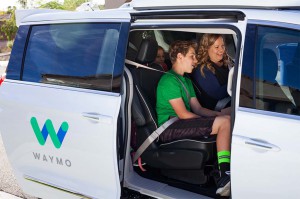
Waymo plans to uses Level 5 autonomous Chrysler Pacificas for its ride-share pilot program in Phoenix next year.
Already considered one of the leaders in autonomous vehicle technology, Waymo quietly began testing completely driverless vehicles in the Phoenix suburb of Chandler, Arizona, last month. Now, the Google spinoff’s CEO said it will begin using those vehicles in its pilot ride-sharing service within “a few months.”
Waymo is one of a number of companies that now wants to take the driver out of the picture entirely, a move that experts believe will lower the cost of hailing a ride to the point where it will become cheaper than owning and operating a personal vehicle.
“We want the experience of traveling with Waymo to be routine, so you want to use our driver for your everyday needs,” Waymo CEO John Krafcik said during a global transportation conference in Lisbon, Portugal.
During the same event, ride-sharing giant Uber announced that it plans to begin testing a flying taxi service, to be called Uber Air, in Los Angeles in 2020, with a goal of launching commercial service by 2028. That would be in time for the next L.A. Olympics.
Waymo is content to stay grounded, using a fleet of specially modified Chrysler Pacifica Hybrid minivans to test the latest version of its self-driving technology. Until recently, the subsidiary of Google parent Alphabet had been focused on autonomous vehicles – those that would require a back-up driver ready to take control in an emergency. But after one of those “operators” fell asleep behind the wheel, CEO Krafcik said, Waymo decided to focus on completely driverless vehicles – Level 5 technology in industry-speak.

Waymo chief John Krafcik outlined some of the company's plans for the future, including using Level 5 autonomous vehicles for its pilot program.
(Waymo gives lo-down on autonomous vehicles. For the story, Click Here.)
After clocking millions of miles in testing, Waymo earlier this year launched a pilot ride-sharing service in Phoenix. Up until now, there has always been a trained operator behind the wheel but on Oct. 19, Krafcik revealed, it set loose its first pilot vehicles with no driver at the ready. The vehicles do have a Waymo employee on board, but they sit in the back seat and, at most, can hit an emergency shut-off switch if something goes wrong.
The driverless vehicles are still in the test process and it will be a “few months,” before they begin taking passengers, Krafcik said. And those will be volunteers among those already participating in the Phoenix-area test program.
Proponents of autonomous and fully driverless technology contend that such vehicles will eventually speed up the nation’s highways and slash the number of crashes, injuries and fatalities. Some, including former National Highway Traffic Safety Administration chief Mark Rosekind, contend the U.S. could eliminate highway deaths entirely.
But not everyone buys into that scenario, at least not initially. California-based non-profit advocacy group Consumer Watchdog argues that Waymo will be using “riders as human guinea pigs.”
(Click Here to see more about Waymo preparing to take on Michigan winter.)
Data released in California by Waymo on autonomous vehicle tests there “show Waymo’s robot cars aren’t ready to roam the roads without a human driver monitoring them,” said John M. Simpson, Consumer Watchdog’s Privacy Project Director. Simpson said the group was particularly concerned because Arizona does not require the tech company to release similar test data results.
Waymo CEO Krafcik downplayed such concerns, arguing that, “Our system runs thousands of checks on itself every second. With these checks, our systems can instantly diagnose any problems and pull over or come to a safe stop if needed.”
Waymo has been running tests in a number of U.S. regions, but the Phoenix area appears to have been chosen for the ride-sharing pilot because of its generally stable weather and smooth roads. Those provide less of a challenge for autonomous sensors. But Waymo also plans to begin testing its technology in Michigan – without private passengers – this winter. That will push the technology to its limits as highway markings are frequently covered and it can be difficult for sensors to determine how to respond when roads get wet or icy.
While Waymo is the first to announce testing of a driverless ride-sharing service a number of competitors are also clocking miles with their autonomous and fully driverless prototypes. That includes carmakers like Ford and General Motors, suppliers such as Delphi and Continental, and ride-sharing services such as Lyft and Uber.
(Delphi makes big investment in autonomous technology with $450m purchase of nuTonomy. Click Here for more.)
A study released by research firm Boston Consulting Group last week forecast that by 2030 as much as a quarter of the miles Americans travel on U.S. highways will be in electrified and autonomous vehicles operated by ride-sharing services.
